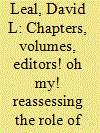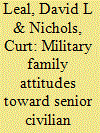|
|
|
Sort Order |
|
|
|
Items / Page
|
|
|
|
|
|
|
| Srl | Item |
| 1 |
ID:
121634


|
|
|
|
|
| Publication |
2013.
|
| Summary/Abstract |
Many scholars discount the value of edited volumes and book chapters to the social science enterprise. Nevertheless, these unique formats advance scholarship, help faculty and graduate students achieve their goals, and enhance teaching and learning. This article therefore assesses the criticisms of volumes and chapters, reconsiders the contributions of these publications, and makes recommendations for improving their accessibility and status.
|
|
|
|
|
|
|
|
|
|
|
|
|
|
|
|
| 2 |
ID:
117621


|
|
|
|
|
| Publication |
2013.
|
| Summary/Abstract |
This article examines Army spousal attitudes toward senior civilian leaders in the United States. Based on the 2004 Military Families Survey, it investigates the demographic, political, and institutional factors that structured the job approval ratings of then-President George W. Bush, Secretary of Defense Donald Rumsfeld, and Secretary of State Colin Powell. Partisanship, race and ethnicity, and opinions about the war in Iraq were consistently significant predictors; experiences directly related to the Iraq war were not. For instance, while Republicans and Latinos were highly likely to support the leadership, past and present deployments were not significant. In addition, Army spouses appear to have distinguished between the three leaders. The results have implications for researchers interested not only in military families but also the role of race and ethnicity in the armed forces, retention dynamics, the civil-military gap, and the Army in a time of war.
|
|
|
|
|
|
|
|
|
|
|
|
|
|
|
|
|
|
|
|
|